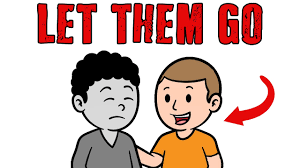
10 Signs You Should Let Go of a Best Friend
Introduction
Today we're going to learn about 10 signs you should let go of a best friend. Let's begin:
Negative Patterns
Do you let your best friend off the hook? Best friends have a kind of immunity in our minds. No matter what happens, you give them the benefit of the doubt, but what if you're cutting your friend way too much slack?
Here's a common scenario: you and your friend get into fights. Your friend lashes out at you, and they hurt your feelings, but instead of apologizing, they make you feel worse. When it's all over, you tell yourself they're just having a bad day. You forgive and forget, but what if it's more than a bad day?
Your best friend may insult you on a regular basis. Maybe they pressure you into doing, saying, or compromising on things you don't want to. You love and care about this person, so you try to excuse their bad behavior. You blame their mistakes on outside stressors. You think to yourself, "Oh, they're probably under a lot of pressure right now," or "Their job has been really strenuous lately." But there will always be stressors in life.
| Question | Consideration |
|---|---|
| Are they truly your friend? | Do they respect and support you? |
| Do you often feel hurt? | Do they apologize sincerely? |
Yes, some people have rough patches. Maybe you got fired from your job or something negative happened in your personal life. When tragedy strikes, your friendships may suffer. Eventually, they will improve. Those bad days will fade into the past, but what if every day is a bad day? You may be ignoring deeper issues that plague your friendship.
You may not want to hear it, but your best friend may be toxic. Just think back on all the bad days that you've had together. Were they few and far between? Was something negative happening in your friend's life, or does your best friend show a pattern of toxic behavior? If you see a pattern, then you and your friend should go your separate ways.
Thoughtless Apologies
A bad friend covers their toxic behavior with shallow apologies. They never think about what they're apologizing for. They don't consider how their actions affect you or anyone else. The only person they think about is themselves.
Selfish friends will apologize in one of two ways. Some will keep it short and simple. They'll shrug, they'll look away, and they'll say "sorry." That's it. These frustrating apologies lack empathy, compassion, or meaning. Even though you hear the words come out of their mouth, you feel annoyed and neglected.
Selfish friends also use backhanded or defensive apologies. They will say sorry, but they won't genuinely apologize. Instead, they'll pass the blame. They'll say something like, "I'm sorry you're upset, but you shouldn't be so sensitive." This is not a meaningful apology. They're not trying to understand how you feel; they're trying to pin their failures on you.
If this sounds familiar, you may need to end the friendship because selfish friends don't care about you the way they should. So, get rid of your selfish friends and find people who value your friendship.
Perpetual Judgment
You and your best friend can live different lifestyles. You two may pursue different definitions of happiness. You may be a passionate workaholic who finds meaning in their work. Your friend may enjoy the freedom and comfort of a simpler lifestyle. Both are valid, both are okay, as long as you accept each other the way you are.
If you can do that, your friendship will only get stronger. But here's the problem: people expect their friends to conform to their lifestyle. The workaholic might, for example, view their friend as lazy. They may judge them for their lack of ambition. In other words, they're invalidating their friend's definition of happiness. That's when a friendship becomes toxic. So, if you and your best friend can't accept each other, then you have to let each other go.
Unconscious Ambivalence
Do you think about your best friend often when you're not together? Do you miss them? Do you wonder what they're up to? If not, that's a big problem.
Best friends are more than random acquaintances. They're not people that you happen to see from time to time. Best friends should be among the most significant people in your life, almost like family. So ask yourself, does this person feel like family? You tell yourself that they are your best friend, but your thoughts and feelings reflect who you truly care about. If you don't think about your friend, your friendship may be weaker than you thought.
Total Exhaustion
Does your friend lift you up? Do they brighten your mood, or do you find your interactions exhausting? Your friend may be a constant source of negativity. They pass around gossip, they fight with everyone you know, and they orient the entire friendship around their life and their drama.
For starters, this person is self-centered. They think the relationship's all about them. They don't ask or care about your life, and to make matters worse, they have a bad attitude. All they want to do is complain or stir up conflict, and that gets exhausting.
So don't waste your time on someone who exhausts you. Your time is valuable, so spend it with your favorite people, people who not only appreciate you but bring you happiness.
The Fragile Friendship
Strong friendships are built on trust. Finding a best friend means finding someone that accepts you completely, someone you can trust with your most intimate secrets. Of course, trust takes time and experience to create. At first, your friendship will be fragile, situational, and insecure.
You trust each other on the surface, but you haven't truly opened up. Over time, your friendship may grow stronger. You may prove your trust to each other. You may become more vulnerable and build the kind of trust that lasts a lifetime, but not every friendship makes it that far. Most are weak and unstable because, in the beginning, trust is easily broken.
Maybe your friend lies to you, maybe they spill secrets you expected them to keep. For one reason or another, you feel like you can't trust your friend. You've tried dozens of times. You want to trust them, but deep down you just can't. If this sounds familiar, it may be time to walk away. A friendship without trust will always be fragile.
A Lack of Balance
Do you feel uncomfortable around your friend? Is every conversation a little bit awkward? This is common for crumbling friendships. You're drifting in different directions, so you're both gradually pulling away.
When that happens, you close yourselves off. You act formal and polite, you put on masks, you pretend to be happier and friendlier than you are, but that air of discomfort never goes away.
If you're stuck in an awkward stalemate, your friendship may be at the end of the road. Sometimes you can resolve your differences with an honest conversation. Try telling your best friend how you feel. Let them know that you're uncomfortable because the problem may be smaller than you think. If your friend is unwilling to talk or change, then there's something deeper at play, an underlying issue that you may never be able to solve.
Encouraging Self-Blame
Do you blame your crumbling friendship on yourself? This usually happens in manipulative friendships. One friend takes all the blame while the other pretends nothing is their fault.
You may think you're the reason your friendship is falling apart, but every friendship is a two-way street. No one is entirely at fault for anything. It's always a team effort.
What if your friend tries to blame you? That's a massive red flag. Your friend is not taking responsibility for their mistakes. They're pinning every problem on you so they can feel better about themselves. A friend like this doesn't care about your well-being. They lie and manipulate because they're trying to protect their ego. It's selfish, it's cruel, and it's a sign that your best friend needs to go.
Lopsided Responsibility
Do you feel responsible for their happiness? Do they expect you to save them from their own mistakes? This kind of friendship is unfair and emotionally exhausting.
Irresponsible friends will overstep your boundaries and tear down your happiness. They have bad attitudes and lazy work ethics, so they expect you to do the hard work for them. If they want a job, for example, they expect you to find it for them. If they want to meet new people, they expect you to introduce them. They demand all of your resources and then they get angry when you say no.
Real friends don't take advantage of each other. They care about your happiness and take charge of their own. So if your best friend needs you to make them happy, it's time to let them go.
Emotional Immaturity
Is your friend a mature person? Do they act or seem younger than you? They may be the same physical age as you, but their emotional age may be years behind.
They may, for example, feel stuck in their younger years while you've moved on. Your friend is clinging to the past, and it's standing in the way of their future. Sometimes emotional immaturity is created by fear.
Your friend may be afraid to grow. They may be afraid to take risks, so they never do. They're unwilling to move forward in their life, but they're affecting more than just their own happiness and success. They're affecting yours too. You should surround yourself with people who are emotionally mature, people who want to grow, people who are facing the same obstacles and challenges that you are. Immature people will drag you back to the past, so stand your ground and cut them loose.


